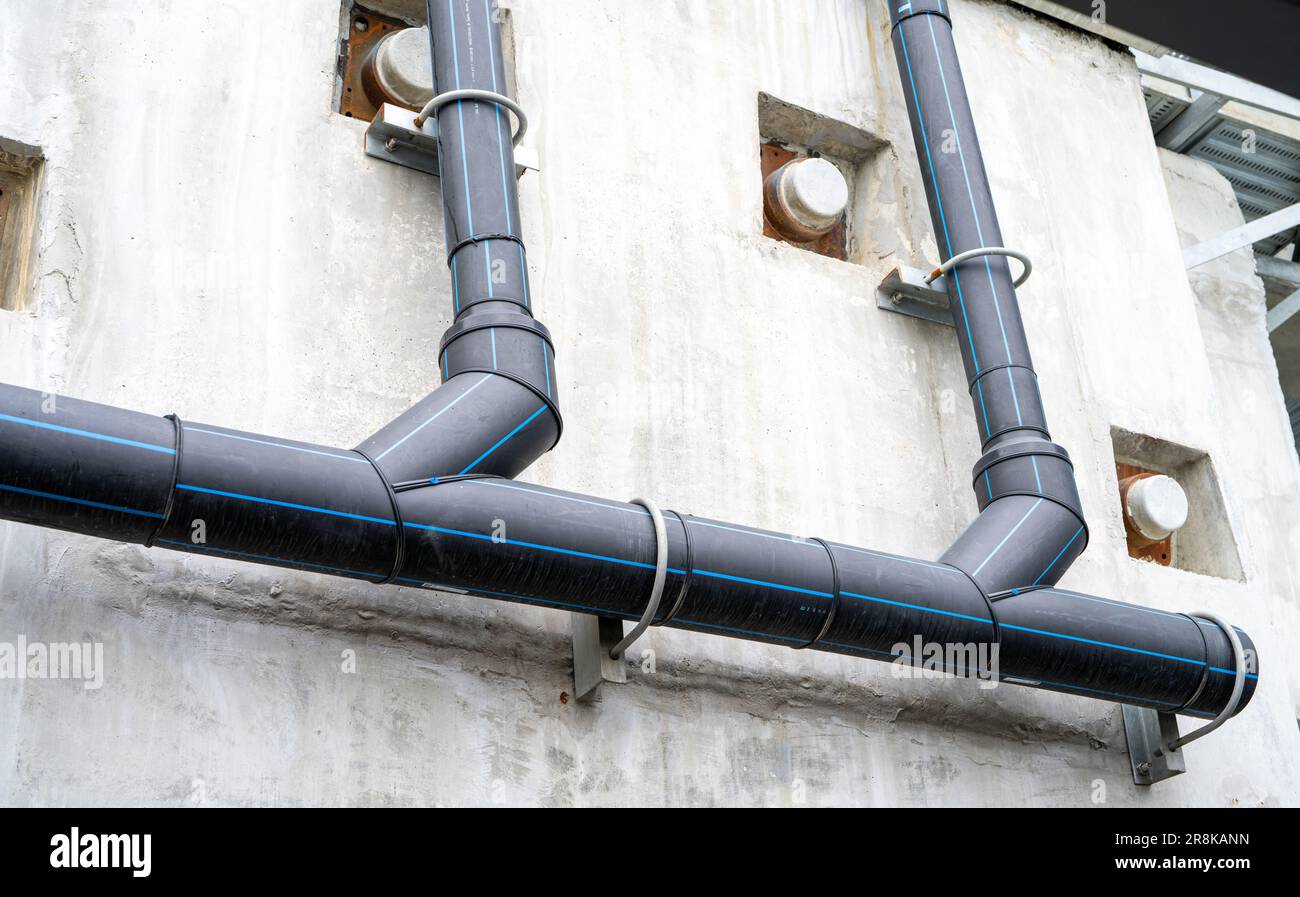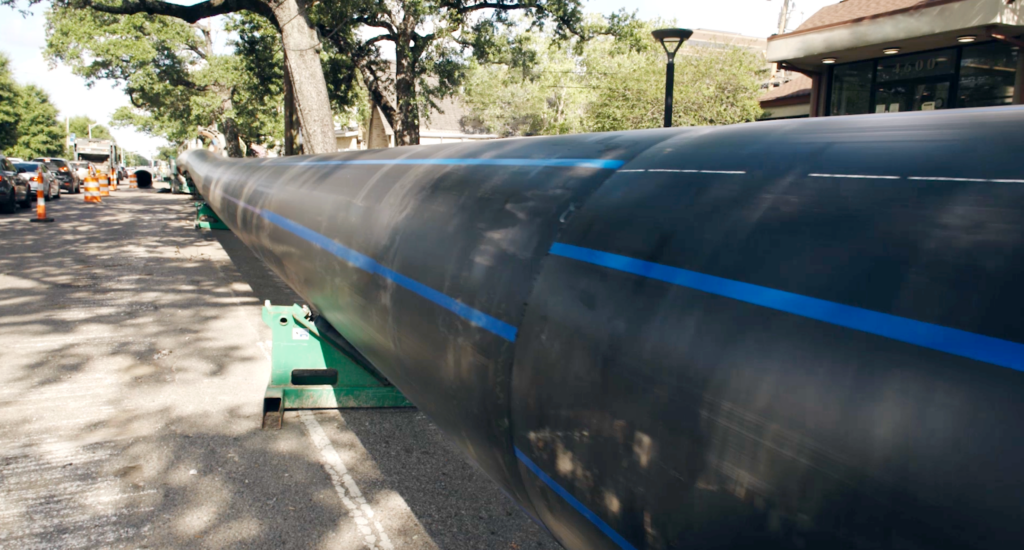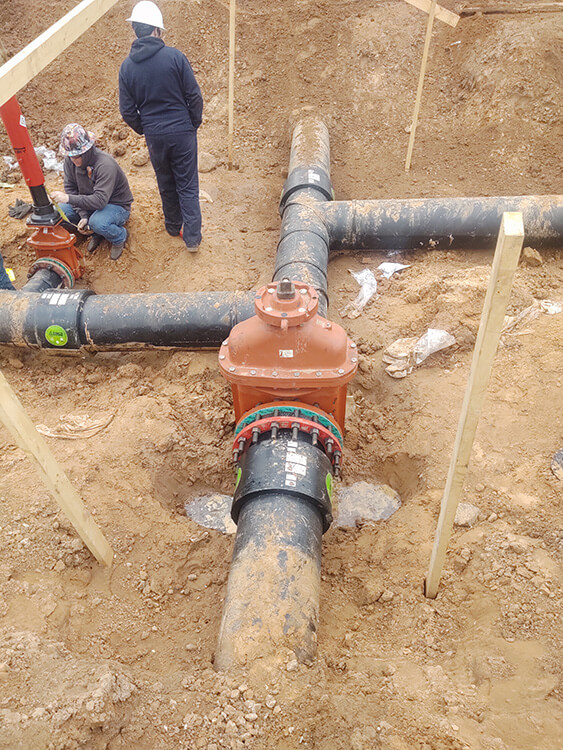Checking Out the Leading Pipeline Manufacturers: High Quality, Integrity, and Technology
The pipeline manufacturing market stands at the junction of high quality, development, and dependability, driven by leading companies such as Tenaris and Vallourec. These suppliers are not just committed to producing high-performance materials however are also introducing sustainable methods that deal with modern-day environmental worries (HDPE Pipe Supplier). As we check out the standards that define quality in pipeline services, it becomes apparent that the landscape is rapidly advancing. What specific developments are emerging, and how are these advancements forming the future of pipeline infrastructure? The answers might redefine industry standards in ways that are not yet totally understood
Leading Manufacturers Review
In the domain of pipeline manufacturing, several essential players become leaders, each adding substantially to the market's landscape. Firms such as Tenaris, Vallourec, and JFE Steel have developed themselves as frontrunners by continually delivering top notch items that fulfill stringent sector requirements. Tenaris, renowned for its ingenious remedies, concentrates on seamless and bonded pipes, catering mainly to the oil and gas market. Vallourec, a French multinational, concentrates on the production of premium tubular services, highlighting sustainability and advanced modern technology in its manufacturing processes.
In A Similar Way, JFE Steel, a significant Japanese manufacturer, is identified for its comprehensive series of steel pipelines, especially those utilized in power and framework projects. Their dedication to r & d has actually allowed them to generate high-performance materials that stand up to rough environmental conditions. In addition, companies like united state Steel and National Oilwell Varco have broadened their market visibility by diversifying their product offerings and boosting operational performances.
These leading producers not just dominate the market yet also drive advancement within the industry, setting criteria for quality and integrity that players aspire to achieve. Their contributions are important for fulfilling the boosting need for effective and resilient pipeline solutions worldwide.
Criteria for Top Quality Evaluation
Quality analysis in pipeline manufacturing rests on two important requirements: material durability requirements and manufacturing procedure efficiency. Making sure that materials fulfill strenuous longevity criteria is vital for the durability and dependability of pipes. Furthermore, maximizing the manufacturing process can improve efficiency while maintaining excellent quality, eventually impacting general efficiency and safety and security.
Product Sturdiness Standards
Ensuring the long life and reliability of pipeline materials is essential for preserving infrastructure integrity and operational performance. Product toughness standards play a vital function in evaluating the top quality of pipes, determining the efficiency and life-span of the products made use of in building and construction. Manufacturers must stick to an array of extensive criteria, consisting of those established by companies such as ASTM International and the American Oil Institute (API)
These requirements evaluate various aspects, consisting of rust resistance, tensile strength, and tiredness efficiency. Pipelines made use of in corrosive atmospheres call for materials that can hold up against chemical degradation, while those subjected to high-pressure problems need to exhibit outstanding tensile toughness.
Furthermore, factors such as temperature level changes and ecological conditions should be thought about, as these can greatly affect product habits gradually. Manufacturers commonly make use of innovative testing methods, consisting of sped up aging examinations, to simulate lasting wear and assurance that products exceed or meet sector benchmarks.
Manufacturing Process Performance
Manufacturers' ability to enhance making procedure effectiveness is essential for generating high-grade pipelines that fulfill stringent market criteria. Efficiency in producing straight affects price administration, manufacturing timelines, and total product stability. To accomplish this, leading pipeline makers carry out sophisticated strategies such as lean manufacturing, automation, and real-time data analytics.
Lean manufacturing principles are essential in decreasing waste and making best use of resource application. By streamlining procedures and getting rid of redundancies, manufacturers can improve productivity while guaranteeing consistent top quality. Automation technologies, including robotics and computer system numerical control (CNC) machines, play a critical role in improving precision and decreasing human error, thus raising the dependability of the end product.
Furthermore, using real-time data analytics enables producers to check manufacturing processes constantly, allowing them to determine traffic jams and make timely adjustments. This proactive technique not just enhances efficiency but additionally sustains top quality assurance protocols by ensuring conformity with governing requirements.
Dependability in Pipeline Solutions
Integrity in pipeline remedies is extremely important, as it straight affects the safety and performance of liquid transportation systems. Secret elements include the resilience of materials used, adherence to extensive testing and certification standards, and the unification of innovative material options that improve performance. Comprehending these elements is important for suppliers intending to deliver reputable pipeline facilities.
Relevance of Toughness
Attaining resilience in pipeline remedies is crucial, as it straight impacts the long-lasting performance and safety of infrastructure. Resilient pipes are necessary for minimizing upkeep expenses and minimizing the chance of tragic failings. This integrity is particularly vital in industries such as oil and gas, water, and wastewater administration, where the effects of pipeline failure can be serious, both financially and ecologically.
The products and making processes utilized by pipeline manufacturers play a substantial function in determining the resilience of the last item. Using top notch resources, advanced technologies, and cutting-edge style principles ensures that pipelines can hold up against various stressors, consisting of stress variations, temperature level variations, and corrosive settings.
Furthermore, the longevity of pipes is closely linked to their ability to stand up to external elements such as soil motion, seismic activity, and chemical exposures. Efficient rust protection techniques, such as finishes and cathodic security, additionally improve the durability of pipelines, guarding them versus deterioration gradually.
Buying resilient pipeline remedies inevitably equates to enhanced operational efficiency, decreased downtime, and enhanced security, affirming the critical significance of toughness in modern-day pipeline manufacturing.
Examining and Certification Standards
In the domain name of pipeline services, extensive testing and qualification standards are vital to ensure the dependability and safety of facilities. These standards function as standards for assessing the performance and longevity of pipeline materials and systems, validating they satisfy specific regulative and industry requirements.
Examining processes generally include different methods, including pressure screening, hydrostatic evaluations, and non-destructive screening methods. These evaluations are vital for identifying prospective weak points or problems in the products before they are released in real-world applications. Additionally, accreditation by recognized organizations warranties that manufacturers adhere to developed standards, which fosters depend on amongst stakeholders, including designers, end-users, and service providers.
Numerous prominent pipeline suppliers take part in continual tracking and improvement of their screening procedures to adjust to evolving sector requirements and technological innovations. Compliance with standards such as ASTM, ASME, and ISO not just boosts product dependability yet likewise lessens the risk of ecological events linked with pipeline failures.
Ingenious Product Solutions
The advancement of ingenious product options has actually changed the landscape of pipeline manufacturing, enhancing both performance and toughness. Advanced products such as high-density polyethylene (HDPE), cross-linked polyethylene (PEX), and composite products have emerged as game-changers, using premium resistance to deterioration, temperature level changes, and pressure variations. These products not just expand the life-span of pipes however additionally reduce maintenance expenses, guaranteeing trusted long-term efficiency.
In addition, makers are progressively taking on clever materials that integrate sensors for real-time monitoring. This modern technology enables proactive upkeep, substantially boosting dependability by discovering leaks or architectural weak points before they rise right into vital failures. The assimilation of nanotechnology has also brought about the advancement of finishings that boost the longevity of pipelines versus abrasion and chemical direct exposure.
Sustainability is another vital focus, with suppliers exploring bio-based composites and recyclable materials that reduce environmental impact. As regulatory standards remain to develop, the emphasis on cutting-edge product services ends up being critical in conference stringent safety and security and environmental requirements. Eventually, these innovations not only boost the dependability of pipeline systems yet also contribute to the general effectiveness and sustainability of energy transport infrastructures.
Technologies in Pipeline Technology
Advancements in pipeline modern technology are reinventing the industry by improving performance, safety, and environmental sustainability. Recent innovations focus on wise pipeline systems that make use of sensing units and IoT technology to check conditions in real time, enabling aggressive maintenance and lowering the danger of failures. These systems can discover leaks, stress changes, and other abnormalities, permitting quick response and minimizing environmental effect.
Furthermore, the advancement of innovative products, such as composite and corrosion-resistant alloys, significantly extends the life expectancy and dependability of pipes. HDPE Pipe Supplier (American Plastics LLC HDPE Pipeline Manufacturer). These products minimize upkeep expenses and boost performance in extreme environments, making them excellent for water, gas, and oil transportation
Moreover, automation and robotics are playing an important duty in pipeline construction and examination. Drones and robot tools assist in studies and analyses of hard-to-reach areas, guaranteeing extensive examinations without jeopardizing safety and security.
Innovative layouts, such as modular pipeline systems, enable for greater versatility in installation and alteration, providing to the vibrant needs of the power field. Together, these technical innovations not just enhance functional performance yet also contribute to a more sustainable and resistant pipeline infrastructure, leading the way for a greener future.
Situation Studies of Success
Across numerous markets, successful executions of innovative pipeline technologies demonstrate substantial improvements in operational performance and safety. One significant instance is the deployment of wise pipeline surveillance systems in the oil and gas industry, where real-time data analytics have actually lowered leak detection times by over 50%. This not only minimizes ecological risks however likewise boosts the overall stability of pipeline framework.

Furthermore, a significant manufacturer implemented robotic inspection innovations in its pipeline upkeep procedures, leading to a 40% enhancement in evaluation performance. This strategy has structured upkeep timetables and significantly lowered downtime.
These study highlight how leading pipeline makers are leveraging sophisticated technologies to foster reliability and functional quality, eventually establishing new criteria for the market. As these successes continue to unfold, they lead the means for additional improvements in pipeline manufacturing and management.

Environmental Sustainability Practices
Often, pipeline manufacturers are prioritizing ecological sustainability methods to reduce their eco-friendly impact and enhance the durability of their items. This dedication is reflected in numerous initiatives targeted at reducing waste, saving power, and utilizing sustainable products throughout the manufacturing process.

Lots of manufacturers are embracing innovative innovations that decrease exhausts and power intake. The integration of automated systems and energy-efficient machinery aids enhance production while lowering dependence on fossil gas. In addition, companies are increasingly turning to eco-friendly products, such as recycled steels and bioplastics, which not only decrease the environmental impact yet additionally advertise a round economic climate.
Pipeline manufacturers are carrying out strenuous lifecycle evaluations to evaluate the ecological implications of their items from inception to disposal. This strategy allows them to recognize possibilities for enhancement and foster accountable sourcing and waste management practices.
Cooperation with environmental companies even more enhances these initiatives, as producers look for to align their procedures with worldwide sustainability goals. Inevitably, these environmental sustainability techniques not only add to a much healthier planet however likewise placement makers as responsible leaders in the market, appealing to environmentally conscious stakeholders and clients alike.
Future Trends in Pipeline Manufacturing
As the need for more reliable and sustainable infrastructure expands, pipeline manufacturing is poised for considerable developments that go now will improve the market. Key patterns anticipated in the coming years consist of the combination of innovative products, such as composite and corrosion-resistant alloys, which enhance longevity while decreasing environmental effect. Manufacturers are also expected to embrace cutting-edge production strategies, like additive manufacturing and automation, to improve procedures, minimize waste, and lower prices.
The surge of clever pipeline technologies, including sensing units and IoT tools, will certainly enable real-time monitoring and predictive maintenance, thereby improving safety and operational efficiency. This electronic transformation will not only optimize source monitoring yet additionally promote conformity with stringent environmental regulations.
Sustainability will continue to be a main emphasis, driving makers to purchase environment-friendly methods, consisting of energy-efficient production approaches and recycling campaigns. As the international focus on climate adjustment intensifies, pipeline suppliers will need to adjust by creating options that satisfy both economic and environmental needs.
Regularly Asked Inquiries

What Industries Primarily Use Pipeline Products From These Manufacturers?
Pipeline products are largely used in sectors such as oil and water, gas and wastewater monitoring, chemical mining, building and construction, and processing. These markets depend on reliable, durable, and safe transport of products and fluids.
How Do Manufacturers Make Sure Conformity With International Pipeline Standards?
Manufacturers guarantee compliance with global pipeline criteria by applying rigorous quality assurance procedures, performing regular inspections, sticking to established regulatory frameworks, and purchasing worker training to advertise understanding and understanding of security and high quality needs.
What Is the Ordinary Life Expectancy of Pipelines From Leading Manufacturers?
The average life expectancy of pipes from leading producers generally ranges from 30 to 100 years, relying on material, environmental conditions, and maintenance practices. HDPE Pipe Manufacturing Texas. Routine assessments and adherence to market requirements substantially affect durability and performance
Exist Certifications Details to Pipeline Production High Quality?
Yes, different certifications exist for pipeline manufacturing top quality, consisting of ISO 9001 for high quality management systems and API criteria particular to pipelines. These certifications assure adherence to extensive safety, efficiency, and ecological standards within the sector.
Exactly How Do Manufacturers Deal With Pipeline Upkeep and Fixes?
Manufacturers commonly apply a positive maintenance strategy that includes regular assessments, keeping track of systems for very early discovery of concerns, and a structured repair service method. This method guarantees pipeline integrity, lessens downtime, and improves total functional performance.
Quality analysis in pipeline manufacturing hinges on 2 vital criteria: product resilience requirements and manufacturing process performance - Pipeline Manufacturer. Material durability criteria play a crucial duty in assessing the top quality of pipelines, dictating the efficiency and life-span of the products used in building. The products and manufacturing processes employed by pipeline makers play a substantial role in figuring out the durability of the final product. The ordinary lifespan of pipelines from leading producers commonly ranges from 30 to 100 years, depending on material, environmental problems, and upkeep practices. Yes, different qualifications exist for pipeline making quality, including ISO 9001 for high quality administration systems and API requirements details to pipes